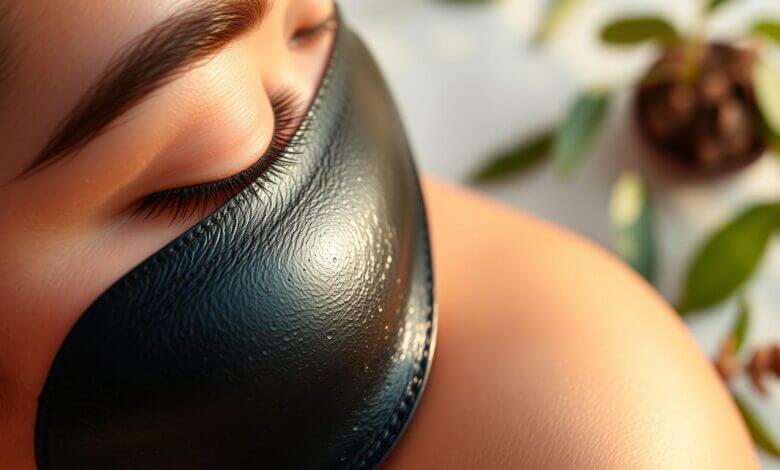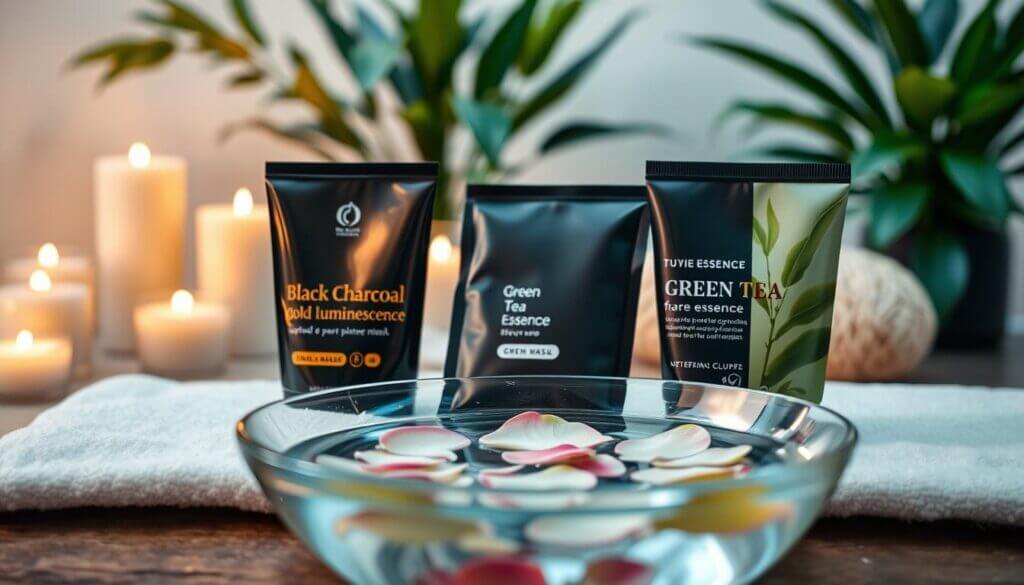The Best Face Masks: Black Charcoal, Gold, Green Tea & More for Glowing Skin
Guide to Choosing the Best Face Masks for Oily, Dry, and Aging Skin

The global face mask market is projected to reach $10 billion by 2027! Indeed, skincare has become more prevalent as it rises to be a staple in beauty care. It caters to oily skin, dry patches, and signs of aging.
This guide will help you choose a face mask. It covers options like black charcoal and hydrating gold masks. You will find out what ingredients to seek out and how often to apply them. Get a better understanding of what masks will work best for your skin type and current skin concerns. With the right mask, you can treat your skin to glowy goodness.
Key Takeaways
- The global face mask market is projected to reach $10 billion by 2027.
- Face masks can help address a variety of skin concerns, from oily skin to aging.
- Many types of face masks exist, including black charcoal, gold, and green tea formulas.
- Knowing the right ingredients to look for and how often to use a mask is key to achieving healthy, glowing skin.
- This guide will recommend the best face masks for all skin types and concerns.
Why face masks should be part of your skincare routine.
Face masks are the perfect addition to a flawless beauty regimen. They are super concentrated to target skin problems, e.g., dull skin, dry skin, acne, and aging. You can treat them by using a mask that suits your skin type and issues.
And face masks are full of good stuff. These are skin foods that deeply nourish and revitalize your skin. They can help improve skin hydration, minimize pores, and even out skin tone and texture.
These masks also diminish fine lines and wrinkles as well. They increase skin elasticity, reduce scarring and spots on acne areas. They help your skin appear brighter & refreshed as well.
Wearing the correct one is what makes all the difference. Gel masks are ideal for oily, acne-prone skin. They’re also great for those who like how gel serums absorb. Cream masks all the way: these ones are best for those of you with dry skin (especially during cooler weather).
For skin with acne and fine, aging wrinkles, use exfoliating masks. Clay masks are used to exfoliate, removing oils and dirt that contribute to acne. Ideal for oily or acne-prone skin when used, charcoal masks purify the face of dirt, oil, and toxins.
Washing your face, exfoliating, and using a few masks can transform your skin. Whether you want to get a glow, hydration, or battle acne, there is a mask for it all. You know what that means: Masks = instant self-care.

What to Look For in a Face Mask
When picking a face mask, it’s key to choose ones with safe, quality ingredients. Stay away from harmful stuff like phthalates, synthetic fragrances, parabens, and siloxanes. These can mess with your skin’s natural balance and harm its health. Instead, go for masks packed with good stuff like hyaluronic acid, clay, charcoal, salicylic acid, honey, and antioxidants. They help tackle your skin issues.
Ingredients to Avoid in Face Masks
- Phthalates
- Synthetic fragrances
- Parabens
- Siloxanes
These ingredients can be tough on your skin and throw off its natural balance. Look for face masks with safe, effective ingredients instead:
- Hyaluronic acid: Hydrates and plumps the skin
- Clay and charcoal: Cleanse pores and absorb oil
- Salicylic acid: Exfoliates and fights acne
- Honey: Soothes and moisturizes
- Antioxidants: Shields the skin from harm
Choosing masks with these ingredients helps you tackle your skin issues. You’ll get a healthy, glowing look.

How Often Should I Use a Face Mask?
Using face masks can change your skin for the better, making it look radiant and healthy. But, it’s key to use them the right amount. Using too many can dry out or irritate your skin. So, knowing how often to use them is important.
Try to use a face mask 1-2 times a week. This helps your skin get the most out of the mask without harming it. For some masks, like clay and charcoal, use them only 1-2 times a week because they can dry out your skin.
But, if you have a hydrating or overnight mask, you can use them more often. Up to 2-3 times a week is okay, depending on your skin type and what you’re trying to fix. It’s about finding the right mix for your skin.
It’s also important to pick masks that fit your skin type and issues. Some experts suggest a “mask in sequence” plan. This means using different masks in a certain order to tackle various skin problems. Doing this with the right frequency can give you the best results.

Think about how you apply masks too. Sheet masks are used once and might not be good for the planet. Peel-off masks can harm your skin’s protective layer if used wrong.
The best face mask routine is one made for your skin type and issues. By finding the right balance and adjusting how often you use them, you can make face masks work wonders for you. This way, you’ll get a glowing, healthy complexion.
Choosing a Face Mask for Oily Skin
If you have oily skin, picking the right face mask can really help. It can control shine, clear pores, and keep your skin balanced. Look for masks with ingredients that reduce oil and shrink pores.
What Type of Face Mask Should You Use for Oily Skin?
For oily skin, masks with clay, charcoal, salicylic acid, and beta hydroxy acids are great. These ingredients soak up extra oil, exfoliate, and deep clean pores without drying out your skin.
The Best Face Mask for Oily Skin
Top picks for oily skin include the Beautycounter Charcoal Mask, Primally Pure Clarifying Mask, and the Aztec Secret Healing Indian Clay Mask. These masks clean, refine, and make your skin look matte and pore-less.
Sheet masks are also good for oily skin. Choose mattifying or purifying ones with green tea, charcoal, or clay. They help control oil and make pores look smaller.
Using a face mask once a week can change how you manage oily skin. Pick a mask that fits your skin’s needs for a clearer, more balanced look. Say hello to less shine and smaller pores.
Choosing a Face Mask for Dry Skin
If you have dry, dehydrated skin, look for face masks with ingredients like hyaluronic acid, ceramides, and soothing oils. These elements help to deeply moisturize and hydrate your skin. They give your skin a much-needed boost of moisture.
What Type of Face Mask Should You Use for Dry Skin?
Cream-based or gel-based face masks are great for dry skin. They are made to deeply hydrate and replenish moisture. Stay away from clay or mud masks, as they can dry out your skin even more.
The Best Hydrating Face Mask for Dry Skin
- Beautycounter Cleansing Balm – This rich, creamy mask deeply nourishes with a blend of shea butter, rosehip seed oil, and vitamin E.
- Beautycounter Supreme Cream – Formulated with hyaluronic acid and niacinamide, this mask intensely hydrates and plumps the look of dry skin.
- Primally Pure Plumping Mask – Infused with pumpkin seed oil and tremella mushroom, this mask restores moisture and softens the appearance of fine lines.
Using a hydrating face mask a few times a week can really help with dryness. Combine it with a gentle, moisturizing skincare routine for the best results.
Choosing a Face Mask for Acne-Prone Skin
If you have acne-prone skin, finding the right face mask can really help. Look for masks with salicylic acid, clay, and charcoal. These ingredients help clear pores, remove dirt, and control oil.
What Type of Face Mask Should You Use for Acne-Prone Skin?
For acne-prone skin, choose masks with ingredients that fight inflammation and bacteria. Honey, turmeric, and green tea can tackle acne’s root causes and calm irritation. Clay and charcoal masks are great too, as they soak up oil and clean deep into pores.
Best Face Masks for Acne-Prone Skin
- Primally Pure Clarifying Mask – Made with bentonite clay, activated charcoal, and tea tree oil, it purifies and controls oil.
- Beautycounter Charcoal Mask – A charcoal-based mask that deeply cleans and refines pores for a clearer look.
- The Ordinary Salicylic Acid 2% Masque – An acne-fighting mask with 2% salicylic acid to exfoliate and clear pores.
- SkinCeuticals Clarifying Clay Masque – A clay-based mask that absorbs oil, minimizes pores, and improves clarity.
- Cetaphil Dermacontrol Purifying Clay Mask – A gentle, acne-friendly clay mask for sensitive skin.
For acne, a consistent skincare routine is crucial. Use these best face masks for acne-prone skin to fight breakouts and get a clearer complexion.
Best Face Mask for Sensitive Skin
If your skin is sensitive, picking the right face masks is key. Avoid harsh ingredients that can irritate your skin more. Instead, go for masks with hyaluronic acid, aloe vera, honey, and oatmeal. These ingredients soothe and hydrate your skin.
Always test a new face mask on a small area first. This ensures it won’t cause any bad reactions. The Primally Pure Soothing Mask and the Beautycounter Charcoal Mask are great choices. They’re gentle and calming, making your skin look refreshed and glowing.
- Look for face masks with hyaluronic acid, aloe vera, honey, and oatmeal to soothe and hydrate sensitive skin.
- Always do a patch test before using a new face mask to check for any reactions.
- Try the Primally Pure Soothing Mask or the Beautycounter Charcoal Mask for a gentle, calming experience.
Choosing the best face masks for sensitive skin means listening to your skin. Pick products made for your specific needs. With the right mask, you can get a glowing, healthy look without any irritation.
Black Face Mask Skin
Looking for a deep cleanse and detox for your face? Try a black charcoal face mask. These masks use activated charcoal to pull out dirt, oil, and pollutants from your skin.
Charcoal is great for cleaning pores. It grabs onto and removes bad stuff, making your skin look fresh and bright. Adding a black face mask to your skincare can really change how your skin looks and feels.
Check out the Beautycounter Charcoal Mask and the Primally Pure Clarifying Mask. Both use activated charcoal for a deep clean. They’re great for dealing with too much oil or clogged pores.
Want to improve your skincare routine for healthier-looking skin? Try a black charcoal face mask. It’s amazing at cleaning pores and can make your skin look smoother and brighter.
Best Anti-Aging Face Mask
As we age, our skin changes a lot. To fight the signs of aging, using targeted face masks is key. These masks can help with fine lines, wrinkles, and a dull complexion. Look for masks with ingredients that make your skin look younger and more vibrant.
What Type of Face Mask is Best for Aging Skin?
For a younger look, choose masks with these ingredients:
- Hyaluronic acid – This ingredient plumps and hydrates the skin, making fine lines and wrinkles less visible.
- Alpha and beta hydroxy acids (AHAs and BHAs) – These exfoliants remove dead skin, making your skin brighter and more even.
- Nourishing lipids – Masks with ceramides and fatty acids strengthen the skin’s barrier and keep moisture in.
- Antioxidants – Masks with vitamins and botanicals fight off environmental damage and free radicals.
Best Anti-Aging Face Masks
Top-rated anti-aging face masks are:
- Beautycounter Supreme Cream Mask – This mask uses hyaluronic acid, AHAs, and botanicals to plump and smooth the skin.
- Primally Pure Plumping Mask – It has lipids, vitamin C, and lactic acid to reduce fine lines and wrinkles.
- The Ordinary Retinol 1% in Squalane – A strong retinol treatment that boosts collagen and fights aging signs.
Using these anti-aging face masks can help target aging skin issues. Always test a small area first and adjust how often you use them based on your skin’s needs.
Conclusion
Masks are also beneficial for any skincare routine. They provide a deeper level of nourishment to your skin for various skin problems. Knowing your skin type will help you narrow down which ingredients should be in a mask for you.
GoldAna Murgic Elevate your masking experience with a luxurious gold mask. Try a detoxifying black charcoal option or a soothing green tea formula. There is something for everyone in this face mask guide. It helps you buy the right face mask for your requirements.
Here you have seen how to care for Oily, Acne, Dry, Sensitive, Aging Skin. Good skincare got you face-masking. And, do you know your price for a radiant, healthy glow? Everyone wants to see their inner beauty.
Picking the right face mask depends on your skin type and needs. Opt for good-quality brands and choose masks according to your skin requirements. This will ensure you benefit from face masks. You will achieve the beautiful, youthful skin you desire.
FAQ
So, what makes up the ideal face mask ingredients?
Its ingredients: hyaluronic acid and clay are really good. Also steer clear of ingredients such as charcoal, salicylic acid, honey and antioxidants. These are actually for what you want to ask from your skin. Choose phthalate-free, synthetic fragrance-free, paraben-, and siloxane free solutions instead.
Face mask yi kitan da hare?
Applying a mask once or two times a week is ideal. Yet, do not use them excessively more than 3 times a week. Overuse of these products can cause your skin to become dry, flaky or irritated.
The best face mask for oily skin which is there.
For Oily skin, a mask with clay, charcoal, salicylic acid or beta hydroxy acids is perfect. Gets rid of greasy sculpting products and help dissolve dead skin cells.
Which Face Mask For Dry Dehydrated Skin ?
For dry skin, use masks with hyaluronic acid, ceramides, and oils. They will nourish your skin. These are the important products for the brightening, and deeply moisturizing effect.
Get recommendations for the best face mask for acne, especially if you have an acne-prone skin.
Salicylic acid, clay, and charcoal masks are excellent for anyone with acne-prone skin. It cleanses the skin by de-clogging pores and eliminates impurities. Honey, turmeric, and green tea fight inflammation and bacteria.
Best mask for sensitive skin
If you have sensitive skin, choose soothing masks. Look for hyaluronic acid, aloe vera, honey, or oatmeal. Avoid harsh ingredients. Try this mask on a patch of skin first.
10+ Things You Should Know About Black Charcoal Face Mask
These black face masks work magic on the cloggy pores by extracting sand and oil. They exfoliate, and remove impurities, excess oil, pollutants. Your skin will be left feeling rejuvenated, smooth and glowing.
Which Face Mask is Best for Aging Skin ?
If you have aging skin, use masks with: a) hyaluronic acid, b) alpha and beta hydroxy acids, and c) nourishing lipids. They plump and hydrate, while also exfoliating the skin in a very gentle manner.
Read More > 10 Best Women’s Fragrance Gift Sets to Captivate & Delight
Read More > 10 Haircare Miracle Leave-In Products for Every Hair
Read More > Whipped Argan Oil: Expert Tips & Where to Find the Best Quality
Read More > Top 10 Frizz Control Hair Products for Every Hair Type
Read More > Best Detangling Brush: Why the Unbrush is Perfect for All Hair Types




